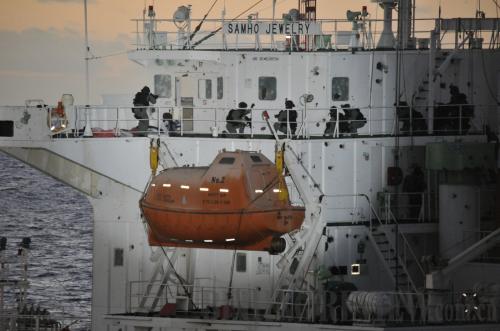|
 |
|
MILITARY RESCUE: South Korean Navy commandos board a ship hijacked by Somali pirates in the Indian Ocean on January 21, rescuing the entire crew and killing eight pirates (XINHUA) |
The expert also said Malaysia has ample experience dealing with piracy, since the Straits of Malacca have long harbored seafaring brigands. Malaysia has also conducted successful anti-piracy actions in concert with its neighbors in recent years.
Military action can be effective in curbing piracy, but should only be used when everything is under control, the expert said. In general, she warned against taking military action, since such a move might trigger an ecological disaster because of the chemicals and oil carried on many of the hijacked ships.
Li Wei, Director of the Institute of Security and Strategic Studies at the China Institutes of Contemporary International Relations (CICIR), said there was a political element behind South Korea's response.
Li said the South Korean military was perceived as slow and weak by South Koreans, after the sinking of the Cheonan warship and the exchange of fire with North Korea on Yeonpyeong Island last year. In addition, South Korea had already paid $9.5 million to Somali pirates to end previous hijackings. So, this time South Korea chose to fight.
Somali pirates, unlike those in the Caribbean, do not want to seize cargo or kill hostages. All Somalis want is ransom. Therefore, military action against Somali pirates might unnecessarily risk the loss of ships and life.
Moreover, Li said, Somali pirates operate in different groups, with their military capabilities varying from group to group. Using military action against well-armed privates might cause heavy losses.
Military action could not eradicate piracy at its source, and it was more important to improve a ship's capacity for self-defense, Li said.
Military action may also have other unintended results. For example, Somali pirates have threatened to kill all South Korean hostages taken in subsequent hijackings as revenge for the South Korean Navy's recent military action.
Ways forward
Military moves seem to have done little to reduce piracy, which has been rampant for years off Somalia's coast and in the Gulf of Aden.
As recently as February 9, Somali pirates hijacked a Greek oil tanker, carrying a crew of 25 and 260,000 tons of crude oil, valued at nearly $200 million. As a result, the International Association of Independent Tanker Owners has called for tougher strikes against Somali pirates since such hijackings could affect international oil supply.
The association said Somali pirates are now using at least 20 captured ships as "mother ships" to carry out piracy in nearby waters, making it harder to tell pirates from legitimate seafarers. It said if Indian Ocean piracy continues at the current rate, oil transportation lanes might be seriously jeopardized.
CICIR's Li has suggested four ways to reduce hijackings: First, countries should improve the efficiency of escort fleets through multinational cooperation. For example, different countries could be responsible for different escort zones. Second, information-sharing mechanisms among countries should be perfected. Third, hi-tech equipment should be deployed to monitor larger areas. Fourth, the self-defense capacity of ships should be enhanced by installing high-pressure water guns, electric fences and security cabins.
During the past 20 years, Somalia has been in chaos due to war and social disintegration. A transitional federal government was established in 2006, but it has not been able to exercise control. Now most of Somalia is in a state of anarchy, with dozens of warlords vying for control.
Due to decades of war and natural disaster, humanitarian crises have caused havoc in Somalia. UN statistics showed the country suffered the greatest number of civilian casualties in 2010 of any country in the world. There were hundreds of civilians killed and at least 7,600 others injured in Mogadishu, the capital.
Now 1.5 million Somalis are homeless, and 650,000 are refugees. In Somalia, about 2.4 million people are in urgent need of humanitarian assistance due to serious drought.
Earlier this month, the UN decided to establish a tri-partite committee along with the Somali Transitional Government and the African Union to coordinate military and political strategies in Somalia. In addition, the UN plans to develop a five-year assistance strategy for Somalia to improve its people's living standards and create development goals for the country.
The root of Somali piracy is "not at sea, but on land," CASS' He said. Somalia must first re-establish law and order and an effective government before piracy can be controlled. The international community should also help facilitate peace talks in Somalia and train its troops to fight piracy.
Rampant Somali Piracy
Somali pirates hijacked 49 ships and took 1,016 hostages in 2010. By February 15, they had conducted 48 attacks, hijacking 11 ships and taking 224 hostages in 2011. As of that day, 33 ships and 712 hostages were still in the hands of Somali pirates.
Eight sailors were killed and 13 were injured during hijackings in 2010. In 2009, four sailors died and 10 were injured. No pirates were killed during hijackings in 2010.
In recent years, Somali pirates have enlarged their sphere of activity. In 2005, they only attacked ships in waters near Somalia. Now, however, they prey on ships as far as 3,000 km from Somalia—extending from Mozambique in the south to Oman in the north.
(Source: International Maritime Bureau Piracy Reporting Center) | 